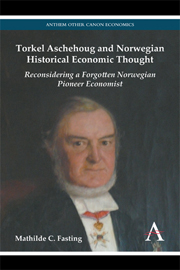 Torkel Aschehoug and Norwegian Historical Economic Thought
Torkel Aschehoug and Norwegian Historical Economic Thought Book contents
- Frontmatter
- Contents
- Acknowledgements
- Chapter 1 Introduction
- Chapter 2 Biography
- Chapter 3 Norwegian Economic and Political Context in the Nineteenth Century
- Chapter 4 Norwegian Economic Thought and Method
- Chapter 5 Development of the Economic Thought of Aschehoug: Statsøkonomisk Forening and the Socialøkonomik Project
- Chapter 6 The German Historical School: Similarities, Influences and Discrepancies
- Chapter 7 Alfred Marshall: Aschehoug and the Adoption of Marginal Theory
- Chapter 8 The French Influence: Adopting Say and Refuting Socialism
- Chapter 9 Views of Labour in the Work of Aschehoug
- Chapter 10 The Entrepreneur: The Fourth Production Factor
- Chapter 11 Trade and Customs Debates from 1840 to 1906
- Chapter 12 The Theory of Economic Crises
- Chapter 13 The Legacy of Aschehoug: Concluding Remarks
- Appendix A Other Norwegian Turn-of-the-Century Economists
- Appendix B Drafts for Socialøkonomik
- Appendix C Detailed Contents of Socialøkonomik (First Editions from 1903 to 1908)
- Notes
- Literature
- Index
Chapter 4 - Norwegian Economic Thought and Method
Published online by Cambridge University Press: 05 March 2014
- Frontmatter
- Contents
- Acknowledgements
- Chapter 1 Introduction
- Chapter 2 Biography
- Chapter 3 Norwegian Economic and Political Context in the Nineteenth Century
- Chapter 4 Norwegian Economic Thought and Method
- Chapter 5 Development of the Economic Thought of Aschehoug: Statsøkonomisk Forening and the Socialøkonomik Project
- Chapter 6 The German Historical School: Similarities, Influences and Discrepancies
- Chapter 7 Alfred Marshall: Aschehoug and the Adoption of Marginal Theory
- Chapter 8 The French Influence: Adopting Say and Refuting Socialism
- Chapter 9 Views of Labour in the Work of Aschehoug
- Chapter 10 The Entrepreneur: The Fourth Production Factor
- Chapter 11 Trade and Customs Debates from 1840 to 1906
- Chapter 12 The Theory of Economic Crises
- Chapter 13 The Legacy of Aschehoug: Concluding Remarks
- Appendix A Other Norwegian Turn-of-the-Century Economists
- Appendix B Drafts for Socialøkonomik
- Appendix C Detailed Contents of Socialøkonomik (First Editions from 1903 to 1908)
- Notes
- Literature
- Index
Summary
Introduction
After Schweigaard the Norwegian milieu of economists grew. Aschehoug was the natural follower of Schweigaard, but he was not alone. Some of his most prominent contemporary economists (and jurists) were Hertzberg, Aarum, Morgenstierne and Jaeger.
A presentation of Aschehoug's views on economic thought and specifically what he says about method and theory will be included. This chapter will end with a small section about the debate on methods which took place during the 1890s at the Statsøkonomisk forening. It was Oscar Jaeger who lectured about method, and the other economists participated in the debate which followed. They mostly accepted the presentation of Jaeger, at least after the turn of the century. The question was whether theoretical economics (and accordingly a more deductive method) should be divided from practical economics (accordingly a more inductive method). Aschehoug did not believe in such a sharp division between what he called the ‘pure’ and the ‘applied’ (social) economics (socialøkonomik), which is why he does not explicitly make this division through his Socialøkonomik, and why he accepts the dual use of methods, even though he distinguishes between socialøkonomik/economics and socialøkonomi/economy in the first chapter (see further comments later in this chapter).
First and foremost, is it possible to talk about a Norwegian historical school in economics? The answer is twofold. There are specific traits of a historical approach in method, namely the emphasis on studying statistics and history.
- Type
- Chapter
- Information
- Torkel Aschehoug and Norwegian Historical Economic ThoughtReconsidering a Forgotten Norwegian Pioneer Economist, pp. 51 - 66Publisher: Anthem PressPrint publication year: 2013


